
Spine and Peripheral Nerve Surgery - Team
Clinicians
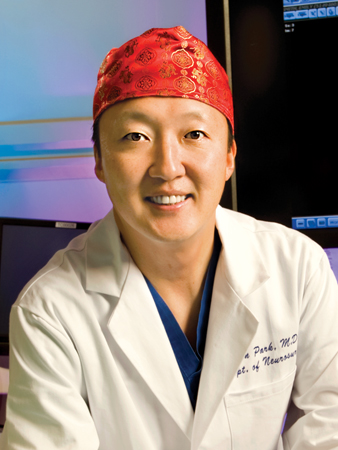 Jon Park, MD, FRCSC
Jon Park, MD, FRCSC
Associate Professor, Neurosurgery
Director, Comprehensive Spine Neurosurgery
Director, Spine Neurosurgery Fellowship/Spine Research Laboratory
Practices at: Stanford University Medical Center
Dr. Park has extensive clinical practice at Stanford in outpatient minimally invasive spine surgery involving spine disc disease, degenerative spinal disorders and compression fractures. He also has special clinical interest in reconstruction of complex spine traumas and treatment of spinal tumors using Cyberknife Radiosurgery.
Dr. Park's research interest includes non-fusion dynamic spinal stabilization, artificial disc technologies, and regenerative spinal technologies.
Dr. Park completed his neurosurgical residency from the world renowned Montreal Neurological Institute. After completing a spine fellowship at UCLA, he was an Assistant Professor of Neurosurgery at the University of Washington prior to joining Stanford faculty.
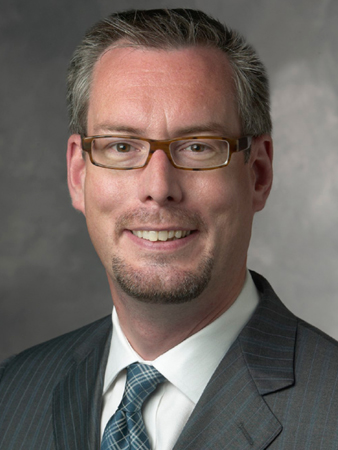 John K. Ratliff, MD
John K. Ratliff, MD
Associate Professor, Neurosurgery
Co-Director, Division of Spine and Peripheral Nerve Surgery
Vice Chair, Operations and Development
Practices at: Stanford University Medical Center
Dr. Ratliff received his medical degree from Tulane University. He is fellowship trained in complex spinal reconstructive surgery and completed a research fellowship in neural regeneration and peripheral nerve repair at the National Institutes of Neurological Disorders and Stroke at the National Institutes of Health.
Dr. Ratliff treats degenerative diseases of the cervical, thoracic and lumbar spine as well as primary and metastatic spinal tumors, spinal infections and chronic pain disorders. He is experienced in minimally invasive spine surgery, revision surgeries and spinal reconstruction, including the use of instrumentation and implants, and artificial disc replacements. Dr. Ratliff is well versed in the evaluation and treatment of nerve compression syndromes and peripheral nerve trauma. His current research focuses on preventing complications in spine surgery, assessing patient outcomes, and developing population-based metrics for assessing surgical outcomes.
 Lawrence M. Shuer, MD
Lawrence M. Shuer, MD
Professor, Neurosurgery
Clinic Chief and Vice Chair of Quality, Neurosurgery
Practices at: Stanford University Medical Center
Dr. Shuer received his BA and MD from the University of Michigan. He completed his residency in neurosurgery at Stanford University before joining the faculty.
He is a past president of the California Association of Neurological Surgeons. His research interests include syringomyelia, pediatric disorders, and degenerative spine disease.
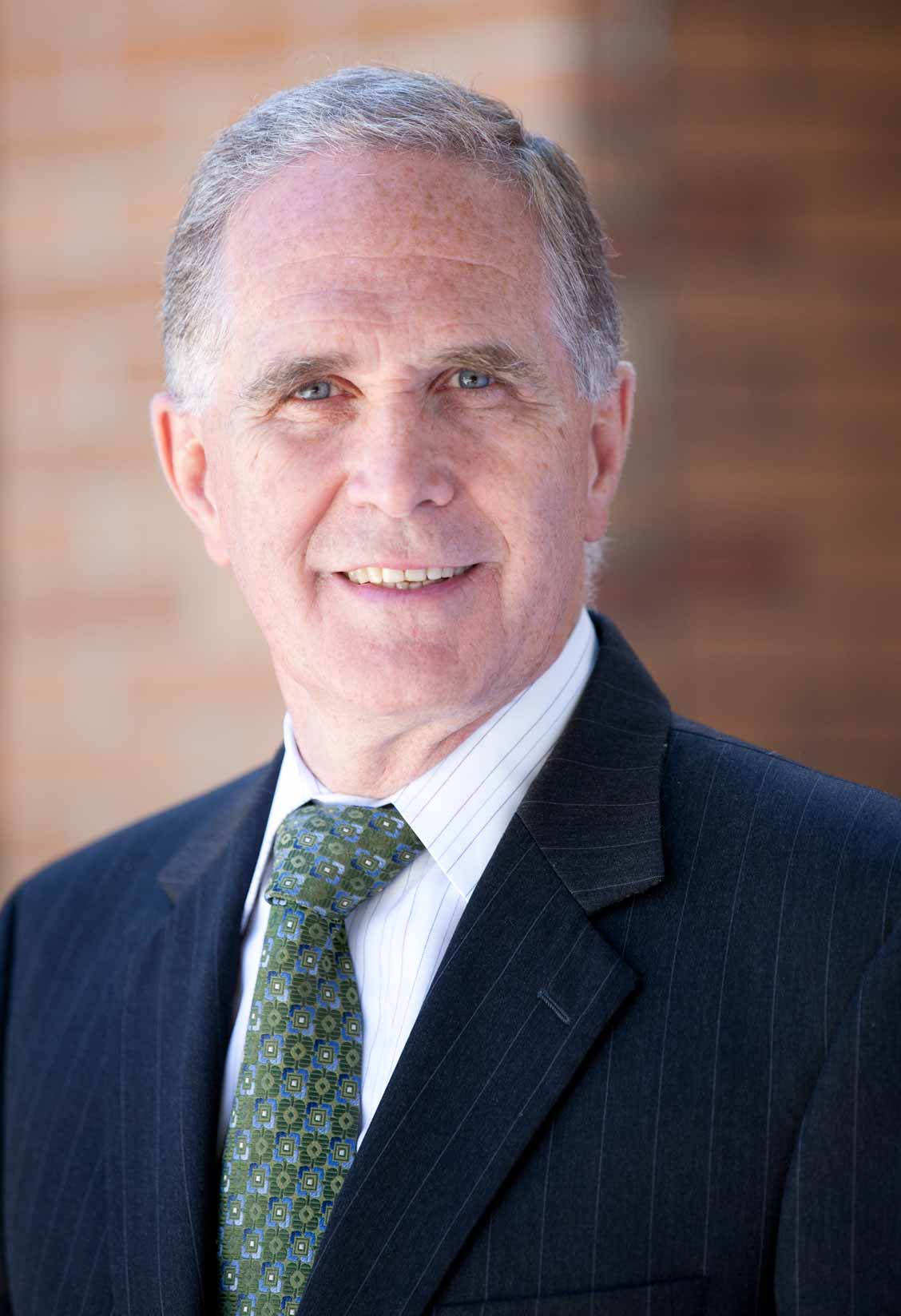 Graham Creasey, MD
Graham Creasey, MD
Paralyzed Veterans of America Professor of Spinal Cord Injury Medicine
Practices at: Veteran’s Affairs Palo Alto Health Care System
Dr. Creasey received his medical degree from the University of Edinburgh in Britain and qualified in surgery through the Royal College of Surgeons of Edinburgh with training in war injuries in Zimbabwe. Since then he has sub-specialized in spinal cord injuries with a particular interest in restoration of function after paralysis using biomedical engineering and biotechnology.
Dr. Creasey’s research interests focus on neural prostheses for restoring bladder, bowel and sexual function after spinal cord injury, in addition to other applications of connecting electronic systems to nervous systems. As clinical director of the Stanford Partnership for Spinal Cord Injury and Repair he is also developing the infrastructure and resources for multi-center clinical trials of neuroprotection and implantation of stem cells after spinal cord injury.
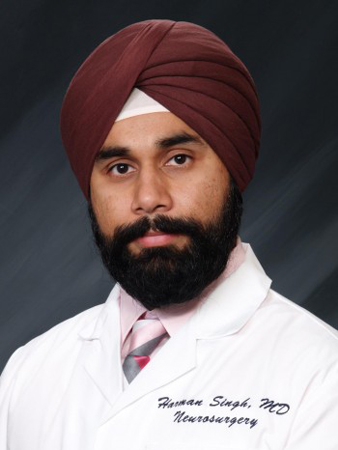 Harman Singh, MD
Harman Singh, MD
Clinical Assistant Professor, Neurosurgery
Practices at: Santa Clara Valley Medical Center
After graduating Summa Cum Laude with Honors from the University of Arizona, Dr. Singh went on to finish his medical schooling at Tufts University School of Medicine in Boston, Massachusetts. This was followed by a General Surgery Internship and Neurosurgical Residency at Thomas Jefferson University Hospital in Philadelphia. During residency, Dr. Singh received extensive training in all aspects of spinal surgery: traumatic, degenerative and oncologic. He trained with international experts on spinal surgery, including Dr. Alex Vaccaro, James Harrop, Todd Albert, Alan Hillenbrand, among others.
Dr. Singh is passionate about resident education, having organized numerous cadaveric workshops and symposiums for residents over the last several years. His clinical and research interests include minimally invasive spinal surgery, spinal oncology and spinal cord injury.
 Stephen Skirboll, MD
Stephen Skirboll, MD
Associate Professor of Neurosurgery at the Stanford University Medical Center
Practices at: Veteran’s Affairs Palo Alto Health Care System and Stanford University Medical Center
Dr. Skirboll's research focuses on screening strategies to identify and characterize cancer stem cells (CSCs) in human gliomas. His lab is pursuing this in several ways: 1) a novel colony-forming antibody live cell array to identify distinct CSC surface phenotypes, 2) RNAi screens to identify kinases critical for CSC tumorigenicity, 3) high throughput small molecule and chemical screens to identify compounds that selectively kill or target CSCs, and 4) identifying CSCs using the tumor specific EGFRvIII
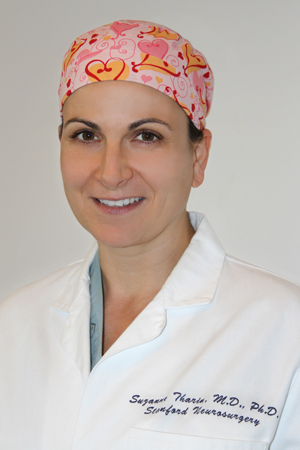 Suzanne Tharin, MD, PhD
Suzanne Tharin, MD, PhD
Assistant Professor of Neurosurgery
Practices at: Veteran’s Affairs Palo Alto Health Care System and Stanford University Medical Center
Suzanne Tharin, MD PhD joined the faculty at Stanford University in 2012 as an Assistant Professor of Neurosurgery. Following her undergraduate degree in Physiology and a Master’s degree in Anatomy and Cell Biology at the University of Toronto, Dr. Tharin completed a PhD in Genetics at Cold Spring Harbor Laboratory and SUNY Stony Brook. She received her MD from Columbia University and then completed her neurosurgery residency at the Brigham and Women's Hospital/Children’s Hospital Boston/Harvard Medical School program. She subsequently completed a clinical fellowship in complex spine surgery at the Cleveland Clinic. Her research program encompasses the molecular controls over cortical neuronal development, spinal cord injury, and regenerative strategies for spinal cord repair, including stem cell-based strategies. As a practicing neurosurgeon at Stanford University Hospital and the Palo Alto VA, Dr. Tharin is dedicated to translating an understanding of neural development into regenerative strategies for the treatment of spinal cord injury.
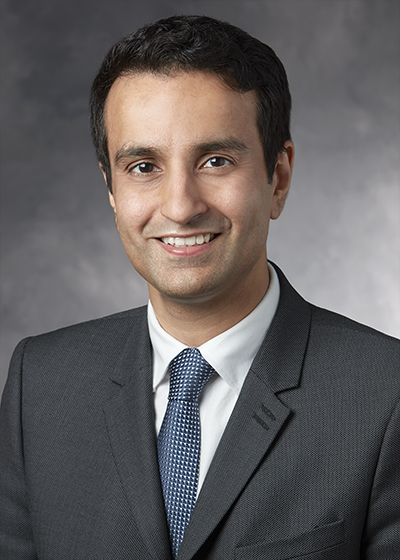 Atman Desai, MD, MA
Atman Desai, MD, MA
Director of Spinal Oncology, Clinical Assistant Professor, Neurosurgery
Practices at: Stanford University Medical Center
Dr. Atman Desai received his BA and medical degree from the University of Cambridge. He completed his neurosurgical residency at Dartmouth-Hitchcock Medical Center, before completing a fellowship in spinal oncology and complex reconstructive surgery of the spine at Johns Hopkins Hospital. Dr. Desai specializes in the management of spinal degenerative disorders, spinal tumors, trauma to the spinal cord and vertebral column, complex reconstruction and restoration of the spine, and minimally invasive spine surgery. His current research focuses on processes that lead to superior outcomes in neurosurgery, disparities in neurosurgical care, development of predictive models of neurosurgical outcomes, and cost effectiveness and comparative effectiveness studies of neurosurgical disorders.
 Marco Lee, MD, PhD, FRCS
Marco Lee, MD, PhD, FRCS
Clinical Assistant Professor, Neurosurgery
Chief of Neurosurgery, Santa Clara Valley Medical Center
Practices at: Santa Clara Valley Medical Center
Dr Lee completed his neurosurgery residency in Oxford and Edinburgh. He underwent subspecialty fellowship training in skull base/cerebrovascular surgery and also radiosurgery at Stanford.
Dr Lee’s spine practice encompasses the surgical treatment of degenerative, traumatic, oncological and vascular conditions of the spine. He has research interest in stem cell treatment of spinal cord injury and participated in the first human stem cell trial in acute spinal cord injury. His other clinical focus includes spine navigation, minimally invasive surgery and radiosurgery of the spine.
 Jason Lifshutz, MD
Jason Lifshutz, MD
Clinical Associate Professor, Neurosurgery
Practices at: Santa Clara Valley Medical Center
Medical training: University of Miami
Residency: Loma Linda
Research: 2 year SCI research at UCI
Fellowship: 2 year spine fellowship, Medical College of Wisconsin
Currently staff at SCVMC
Basic research scientists
 Giles W. Plant, PhD
Giles W. Plant, PhD
Associate Professor, Neurosurgery
Research Director, Stanford Partnership for Spinal Cord Injury and Repair
Dr. Plant is the director of basic science for the Stanford Partnership for Spinal Cord Injury and Repair, which brings together researchers and clinicians to collaborate on translational research aimed at spinal cord regeneration and repair and improving the quality of life of people paralyzed by spinal cord injury through rehabilitation and restoration of function. As research director, he co-leads the partnership, which includes spinal cord injury units at the VA Palo Alto Health Care System and the Santa Clara Valley Medical Center.
Dr. Plant’s current research interests are spinal cord injury, human mesenchymal and induced pluripotent stem cell transplantation, olfactory ensheathing glia, Schwann cell biology and transplantation, peripheral nerve and optic nerve injury.
Instructors
 Wonjae Lee, PhD
Wonjae Lee, PhD
Instructor, Department of Neurosurgery
The overall theme of my research is to identify and reconstruct the key morphodynamic features of the hierarchical neural organizations in developmental, pathological, and remodeling phases. The insights from these investigations have direct implications for developing tissue regenerative strategies that could induce desirable behaviors of endogenous or exogenously grafted cells. My experimental model is developed on hydrogel-based 3D engineered tissues to elucidate the roles of the biomechanical stimuli, the temporospatial conditions of the soluble biological factor gradients, and the relative spatial distribution of the different cell types. In addition, there is a parallel effort to translate the 3D tissue design strategies into a cell-based high-throughput platform for efficient screening of the biologically active molecules. The multiscale features of these investigations are implemented by interdisciplinary collaboration across the fields of microfabrication, drug delivery, microfluidics, biomaterials, bioimaging, computational analysis and cell biology.
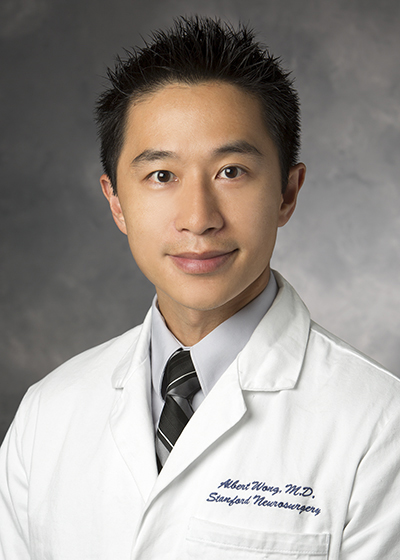 Albert P. Wong, MD
Albert P. Wong, MD
Clinical Instructor, Neurosurgery
Practices at: Stanford University Medical Center
Dr. Wong received his Bachelors of Science in Biological Sciences from the University of California, Irvine. He completed his medical school at Michigan State University – College of Human Medicine. Dr. Wong completed his neurosurgery residency at Northwestern University – Feinberg School of Medicine. The prestigious hospital in Chicago, IL was ranked #6 best hospital and #7 best neurosurgery training program in the country by the US News and World Report Rankings in 2013-2014. Dr. Wong also completed an Advanced Specialty Training Fellowship in minimally invasive spine and complex deformity reconstruction at Northwestern University. During his residency, he was mentored by world renown neurosurgerons, including Dr. Hunt Batjer, Dr. Stephen Ondra, Dr. Richard Fessler, and Dr. Tyler Koski. His research interests include minimally invasive surgical approaches to spinal tumors and spinal cord injury regeneration. He has over fifty peer-reviewed publications, abstracts, book chapters, and presentations in his academic career.
Nurse Practitioners
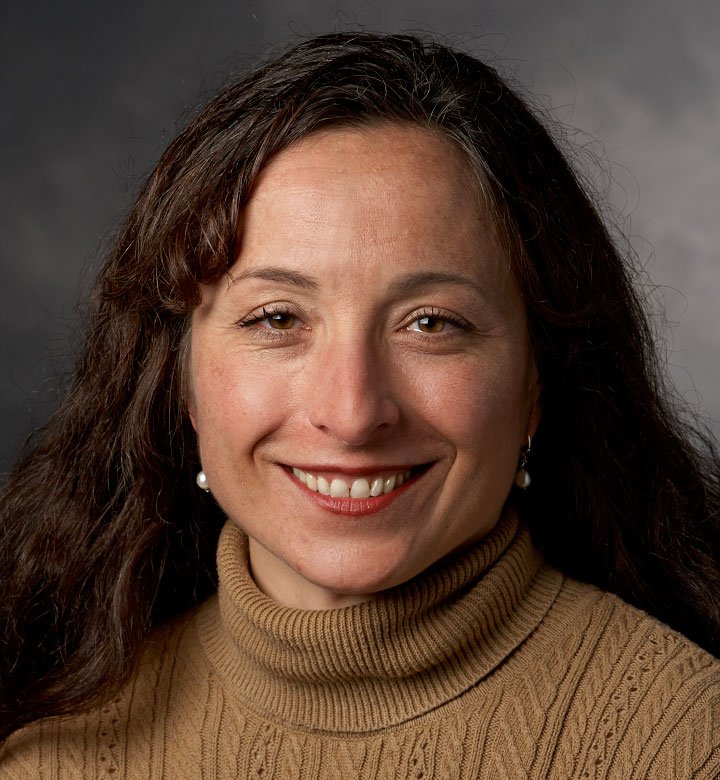 Vania Bernatsky, NP
Vania Bernatsky, NP
Vania received her Master of Science in Nursing with a minor in Education from the University of California, San Francisco in 2001. She is certified as an Acute Care Nurse Practitioner through the American Academy of Nurse Practitioners, and is a member of the American Association of Neurosciences Nursing, American Association of Nurse Practitioners and Sigma Theta Tau. She has spent her career caring for patients both in acute care inpatient, as well as outpatient settings.
 Carrie Chan, NP
Carrie Chan, NP
Carrie Chan joined the spine team in November 2012. Previously, she worked at the University of Southern California with neurosurgery spine patients on both an inpatient and outpatient basis. She is a board-certified Acute Care Nurse Practitioner and certified in Nursing Professional Development. Prior to specializing in neurosurgery care, Carrie was an educator for six years and also worked in the operating room, intensive care unit and post anesthesia recovery unit. Carrie is also an assistant faculty member at California State University, Los Angeles and recently was the moderator for the LAC+USC Neurotrauma Symposium.
 Candice Osuga Lin, MSN, APRN, BC, ACNP
Candice Osuga Lin, MSN, APRN, BC, ACNP
Candice earned her undegraduate degree in Biological Sciences from the University of California, Davis. She received her Master of Science in Nursing from Vanderbilt University. She is certified as an Acute Care Nurse Practitioner through the American Academy of Nurse Practitioners, and is a member of the American Association of Neurosciences Nursing, American Association of Nurse Practitioners and Sigma Theta Tau.
She has been active in the care of adult neurosurgery patients. Her interests include neuro-oncology and degenerative spine disease.
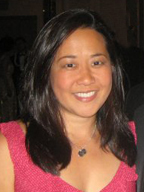 Elizabeth Lee, RN, NP, MSN
Elizabeth Lee, RN, NP, MSN
Elizabeth Lee joined the neurosurgery department in 1996 working as an inpatient and outpatient nurse practitioner. She obtained her bachelors degree in nursing in 1993, and her master's degree in geriatric and family nurse practitioner degree in 1996 from University of California Los Angeles. She has worked in all fields of neurosurgery including spine, neuro-oncology, cerebrovascular, and functional neurosurgery.
Collaborators
 Richard A. Olshen, PhD
Richard A. Olshen, PhD
Professor of Health Research & Policy (Biostatistics) and, by courtesy, of Electrical Engineering and of Statistics
Olshen's research is in statistics and their applications to medicine and biology. Many efforts have concerned tree-structured algorithms for classification, regression, survival analysis, and clustering. Those for classification have been used with success in computer-aided diagnosis and prognosis, while those for clustering have been applied to lossy data compression in digital radiography. Modeling and sample reuse methods have been developed for longitudinal data, concerning gait analysis; renal physiology; cholesterol; nephrophysiology; and recently, molecular genetics.
Lu Tian, PhD
Associate Professor of Health Research and Policy (Biostatistics)
